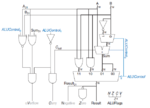hbelkasmi
Newbie
hello,
I'm trying to implement a 32 bit ALU with Input a,b and output Result and 4 bit ALUFlags in system verilog.
the problem for me is that i Don't know how to implement the ALUFlags especially the Carryout.
should I use the one bit adder/sabstract .
Could any one help me
thank you in advance

this my code
I'm trying to implement a 32 bit ALU with Input a,b and output Result and 4 bit ALUFlags in system verilog.
the problem for me is that i Don't know how to implement the ALUFlags especially the Carryout.
should I use the one bit adder/sabstract .
Could any one help me
thank you in advance

this my code
Code Verilog - [expand]
Last edited by a moderator:

